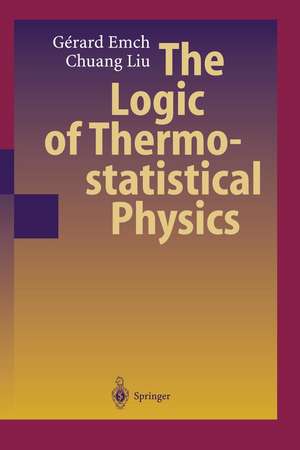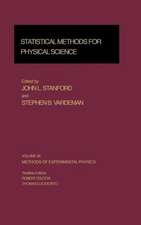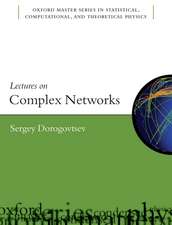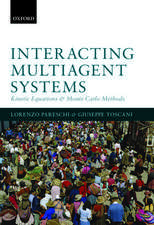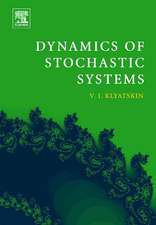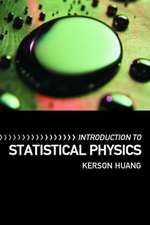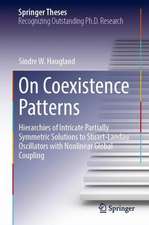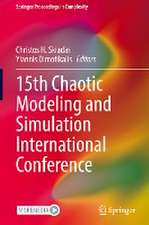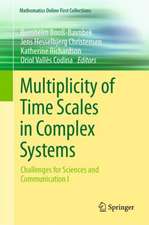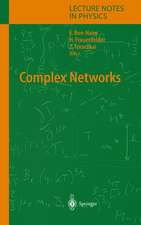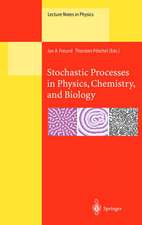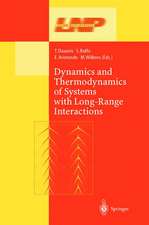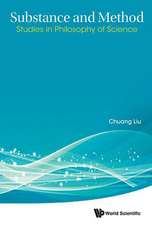The Logic of Thermostatistical Physics
Autor Gerard G. Emch, Chuang Liuen Limba Engleză Paperback – 17 sep 2011
| Toate formatele și edițiile | Preț | Express |
|---|---|---|
| Paperback (1) | 1236.69 lei 6-8 săpt. | |
| Springer Berlin, Heidelberg – 17 sep 2011 | 1236.69 lei 6-8 săpt. | |
| Hardback (1) | 1240.93 lei 6-8 săpt. | |
| Springer Berlin, Heidelberg – 30 noi 2001 | 1240.93 lei 6-8 săpt. |
Preț: 1236.69 lei
Preț vechi: 1508.16 lei
-18% Nou
Puncte Express: 1855
Preț estimativ în valută:
236.63€ • 247.07$ • 195.85£
236.63€ • 247.07$ • 195.85£
Carte tipărită la comandă
Livrare economică 05-19 aprilie
Preluare comenzi: 021 569.72.76
Specificații
ISBN-13: 9783642074622
ISBN-10: 3642074626
Pagini: 720
Ilustrații: XV, 703 p.
Dimensiuni: 155 x 235 x 38 mm
Greutate: 0.99 kg
Ediția:Softcover reprint of the original 1st ed. 2002
Editura: Springer Berlin, Heidelberg
Colecția Springer
Locul publicării:Berlin, Heidelberg, Germany
ISBN-10: 3642074626
Pagini: 720
Ilustrații: XV, 703 p.
Dimensiuni: 155 x 235 x 38 mm
Greutate: 0.99 kg
Ediția:Softcover reprint of the original 1st ed. 2002
Editura: Springer Berlin, Heidelberg
Colecția Springer
Locul publicării:Berlin, Heidelberg, Germany
Public țintă
ResearchCuprins
1. Theories and Models: a Philosophical Overview.- 2. Thermostatics.- 3. Kinetic Theory of Gases.- 4. Classical Probability.- 5. Modern Probability: Syntax and Models.- 6. Modern Probability: Competing Semantics.- 7. Setting-up the Ergodic Problem.- 8. Models and Ergodic Hierarchy.- 9. Ergodicity vs. Integrability.- 10. The Gibbs Canonical Ensembles.- 11. Phase Transitions: van der Waals to Lenz.- 12. Ising and Related Models.- 13. Scaling and Renormalization.- 14. Quantum Models for Phase Transitions.- 15. Approach to Equilibrium in Quantum Mechanics.- 16. The Philosophical Horizon.- A. Appendix: Models in Mathematical Logic.- A.1 Syntax.- A.2 Semantics.- B. Appendix: The Calculus of Differentials.- B.1 Green’s Theorem.- B.2 Stokes’ and Gauss’ Theorems.- B.3 Higher Differentials.- C. Appendix: Recursive Functions.- D. Appendix: Topological Essences.- D.1 Basic Definitions.- D.2 Examples from Functional Analysis.- D.3 Separability and Compactness.- D.4 The Baire Essentials.- E. Appendix: Models vs. Models.- E.1 Models in Wigner’s Writings and in the Third Wigner Symposium.- E.2 A Search for Precedents.- E.3 The Case.- E.4 Closing Statements.- References.- Citation Index.
Recenzii
From the reviews of the first edition:
"Gibbs introduced one century ago an axiomatic approach to statistical mechanics. The a posteriori remarkable success of the Gibbsian formalism is, however, even today in sharp contrast to our lack of understanding of its mechanical foundation. The book The Logic of Thermostatiscal Physics puts into perspective this contrast for classical mechanical systems and for their quantum mechanical counterparts. [...] The book deals with many aspects of not only the logical but also the physical foundation of thermostatistics. Tracing the history of its development makes it a pleasure to read." (Mathematical Reviews 2003g)
"[This] clearly written book contains interesting historical remarks and shows the philosophy behind thermo-statistics. The extraordinarily detailed list of references and its far-reaching range makes the book valuable for mathematicians, physicists and philosophers of science in research and teaching. Its representation may stimulate further philosophical investigations." (Zentralblatt MATH 2004, vol. 1033, page 571)
"This book is a tremendously erudite and comprehensive resource in foundations of statistical mechanics. It is also a significant contribution to the philosophical discussion of models and theories. Philosophers will value the applications of the semantic view of the theories to a wide range of cases in physics. … For those doing research in foundations of statistical physics, having this wealth of information in one place will prove invaluable." (Craig Callender, Studies in History and Philosophy of Modern Physics, Vol. 35, 2004)
"In this book a mathematical physicist and a philosopher report on their professional struggle with the foundational problems of thermodynamics and statistical mechanics. … It is an excellent historical and technical introduction to the BCS theory of superconductivity, and to more recent work on mean field models of dilutegas BEC." (C. Savage, The Physicist, Vol. 39 (3), 2002)
"Gibbs introduced one century ago an axiomatic approach to statistical mechanics. The a posteriori remarkable success of the Gibbsian formalism is, however, even today in sharp contrast to our lack of understanding of its mechanical foundation. The book The Logic of Thermostatiscal Physics puts into perspective this contrast for classical mechanical systems and for their quantum mechanical counterparts. [...] The book deals with many aspects of not only the logical but also the physical foundation of thermostatistics. Tracing the history of its development makes it a pleasure to read." (Mathematical Reviews 2003g)
"[This] clearly written book contains interesting historical remarks and shows the philosophy behind thermo-statistics. The extraordinarily detailed list of references and its far-reaching range makes the book valuable for mathematicians, physicists and philosophers of science in research and teaching. Its representation may stimulate further philosophical investigations." (Zentralblatt MATH 2004, vol. 1033, page 571)
"This book is a tremendously erudite and comprehensive resource in foundations of statistical mechanics. It is also a significant contribution to the philosophical discussion of models and theories. Philosophers will value the applications of the semantic view of the theories to a wide range of cases in physics. … For those doing research in foundations of statistical physics, having this wealth of information in one place will prove invaluable." (Craig Callender, Studies in History and Philosophy of Modern Physics, Vol. 35, 2004)
"In this book a mathematical physicist and a philosopher report on their professional struggle with the foundational problems of thermodynamics and statistical mechanics. … It is an excellent historical and technical introduction to the BCS theory of superconductivity, and to more recent work on mean field models of dilutegas BEC." (C. Savage, The Physicist, Vol. 39 (3), 2002)
Textul de pe ultima copertă
This book deals with models and model-building in classical and quantum physics; it relies on logic and the philosophy of science as well as on modern mathematics. The reader will also find vistas into the history of ideas. The philosophical analysis is based on the separation of syntax and semantics which is at the root of Kolmogorov's theory of probability; recursive functions and algorithmic complexity are used to discuss entropy and randomness. Basic concepts are discussed together with concrete physical models for phase transitions, scaling, renormalization semigroups, and the irreversible approach to equilibrium. The book is intended for mathematicians, physicists and philosophers of science, both researchers and graduate students.
Caracteristici
The only book to discuss in detail the philosophical as well as mathematical concepts needed for model-building in statistical mechanics and thermodynamics Can be seen as a handbook for future research and has a good chance to become a modern classic in mathematical physics Includes supplementary material: sn.pub/extras
